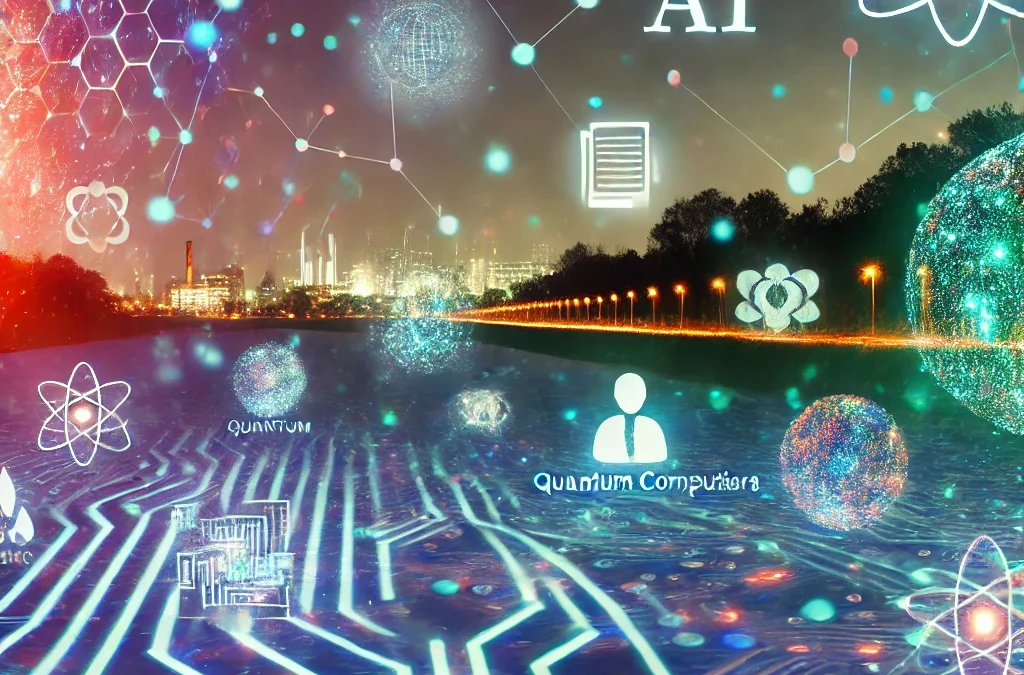How Quantum Computing is Shaping the Future: A Deep Dive into the Next Technological Revolution
Quantum computing, once the realm of theoretical physics, is rapidly moving toward reality and promises to transform the world as profoundly as classical computing did in the 20th century. Unlike classical computers, which process information in binary (0s and 1s), quantum computers harness the unique properties of quantum mechanics, such as superposition, entanglement, and quantum tunneling, to perform complex calculations that are beyond the capabilities of traditional systems.
In this article, we’ll explore how quantum computing is shaping the future across various industries, driving innovation, and solving problems that once seemed insurmountable. From healthcare and artificial intelligence to cryptography and climate change, the potential applications of quantum computing are vast and transformative.
1. The Fundamentals of Quantum Computing
Before diving into how quantum computing is changing the world, it’s essential to understand the basics of how it works. Quantum computers operate on qubits (quantum bits) rather than classical bits. Unlike traditional bits, which are either 0 or 1, qubits can exist in a superposition of both 0 and 1 simultaneously. This allows quantum computers to process multiple possibilities at once, giving them the ability to solve complex problems much faster than classical computers.
Key principles of quantum computing:
- Superposition: Qubits can be in multiple states simultaneously, enabling quantum computers to perform many calculations at once.
- Entanglement: Two qubits can become entangled, meaning the state of one qubit instantly affects the state of another, regardless of the distance between them. This allows for faster information processing.
- Quantum Tunneling: Quantum computers can explore multiple solutions to a problem at the same time, enabling them to “tunnel” through barriers that classical computers cannot.
These principles make quantum computing uniquely suited for solving problems that require analyzing vast amounts of data or simulating extremely complex systems—tasks that classical computers struggle with.
2. Revolutionizing Healthcare and Drug Discovery
One of the most significant areas where quantum computing is poised to make an impact is in healthcare and pharmaceuticals. The process of drug discovery is notoriously slow and expensive, often taking years of research, simulations, and clinical trials to bring new medications to market. Quantum computing can revolutionize this process by enabling researchers to simulate the behavior of molecules and proteins at a quantum level.
How Quantum Computing Will Transform Drug Discovery:
- Molecular Simulation: Quantum computers can simulate molecular interactions with unprecedented accuracy, helping researchers identify how compounds will behave and interact with the human body. This capability will significantly speed up the process of discovering new drugs for diseases like cancer, Alzheimer’s, and Parkinson’s.
- Protein Folding: One of the most challenging problems in biology is understanding how proteins fold into specific shapes, which affects their function. Quantum computing can model protein folding in real-time, offering insights into diseases caused by misfolded proteins and enabling the development of more effective treatments.
- Personalized Medicine: By analyzing genetic data and understanding how different molecules interact with individual genomes, quantum computing will facilitate personalized medicine, where treatments are tailored to the specific genetic makeup of a patient.
3. Advancing Artificial Intelligence and Machine Learning
The intersection of quantum computing and artificial intelligence (AI) holds immense potential. While AI is already making waves in industries like healthcare, finance, and robotics, its progress is limited by the computational power of classical systems. Quantum computing can supercharge AI by exponentially increasing its capacity to process data, analyze patterns, and make predictions.
How Quantum Computing Enhances AI:
- Faster Data Processing: Quantum computers can process massive amounts of data in parallel, allowing machine learning algorithms to train faster and more effectively. This will accelerate advancements in natural language processing, computer vision, and predictive analytics.
- Improved Pattern Recognition: AI relies on recognizing patterns in data to make decisions. Quantum computers can identify complex patterns and correlations in large datasets that are difficult or impossible for classical computers to detect.
- Optimization Algorithms: Many AI tasks involve optimization problems—finding the best solution from a set of possible options. Quantum computing can solve optimization problems much faster than classical systems, improving decision-making in fields like logistics, finance, and supply chain management.
The combination of quantum computing and AI will lead to more advanced autonomous systems, more precise predictions in fields like climate science, and the development of general AI that can perform a wide variety of tasks across disciplines.
4. Transforming Cryptography and Cybersecurity
Quantum computing has profound implications for cryptography, the science of securing communication and data. Most encryption methods in use today rely on the difficulty of solving mathematical problems that classical computers struggle with, such as factoring large prime numbers. However, quantum computers can solve these problems in a fraction of the time, potentially rendering many current encryption systems obsolete.
The Impact on Cryptography:
- Breaking Traditional Encryption: Quantum computers could easily break encryption schemes like RSA and ECC (Elliptic Curve Cryptography) by factoring large numbers much faster than classical computers. This poses a threat to the security of sensitive data, including financial transactions, government communications, and personal information.
- Quantum-Safe Encryption: To address this challenge, researchers are developing quantum-resistant cryptographic algorithms that will be secure against attacks from quantum computers. These algorithms use mathematical structures that quantum computers cannot easily break, ensuring data remains secure in the post-quantum era.
- Quantum Key Distribution (QKD): Quantum computing will also enable quantum key distribution, a method of securely sharing encryption keys using the principles of quantum mechanics. QKD is theoretically unbreakable because any attempt to intercept the key alters its quantum state, alerting the parties involved.
Quantum computing’s impact on cybersecurity will lead to a complete overhaul of how we protect digital information, with industries like banking, defense, and healthcare leading the charge to implement quantum-safe encryption.
5. Solving Complex Environmental Problems
As the world faces increasingly urgent environmental challenges, from climate change to resource depletion, quantum computing offers a new tool for addressing these problems at a global scale. Quantum computers can simulate and model complex systems in nature, such as atmospheric conditions, chemical reactions, and ecological interactions, in ways that classical computers cannot.
Quantum Computing in Environmental Science:
- Climate Modeling: Quantum computers can run more accurate and detailed climate models, helping scientists predict future climate scenarios with greater precision. This will be crucial for developing strategies to mitigate the effects of climate change, such as rising sea levels and extreme weather events.
- Sustainable Energy Solutions: Quantum computing can optimize the design and operation of renewable energy systems, such as solar panels, wind farms, and batteries. By simulating how energy flows through these systems at a quantum level, we can create more efficient and sustainable energy sources.
- Environmental Chemistry: Quantum simulations can help scientists discover new chemical compounds for use in carbon capture technologies and pollution reduction. This will enable industries to reduce their environmental impact and contribute to a more sustainable future.
6. Revolutionizing Supply Chain and Logistics
Supply chains are complex networks involving the movement of goods and materials across the world. Optimizing supply chains is essential for businesses to reduce costs, increase efficiency, and meet customer demands. Quantum computing can solve many of the optimization problems that make supply chains difficult to manage.
How Quantum Computing Improves Supply Chains:
- Optimizing Routes: Quantum computers can solve route optimization problems, such as the traveling salesman problem, much faster than classical computers. This will enable logistics companies to determine the most efficient routes for delivering goods, reducing fuel costs and delivery times.
- Supply Chain Resilience: Quantum simulations can model potential disruptions to supply chains, such as natural disasters or political instability. This will help companies build more resilient supply chains by identifying vulnerabilities and planning for contingencies.
- Inventory Management: Quantum computing can analyze data on demand, production, and transportation in real-time, allowing businesses to optimize their inventory management and reduce waste.
By improving the efficiency and resilience of supply chains, quantum computing will lead to lower costs for businesses and faster, more reliable delivery of goods to consumers.
Conclusion: The Future of Quantum Computing
As quantum computing continues to evolve, its impact will extend far beyond the scientific community and into every aspect of modern life. From healthcare and AI to cybersecurity and climate science, quantum computing offers the potential to solve some of the most complex and pressing challenges of our time.
The future shaped by quantum computing is one of unparalleled possibilities. It is a future where we can simulate the human body to discover new cures, protect sensitive data with unbreakable encryption, and design sustainable systems that protect our planet. As quantum technology matures, it will unlock new levels of human achievement and usher in an era of innovation unlike anything we’ve seen before.
The quantum revolution has begun, and its full potential is only starting to be realized.


